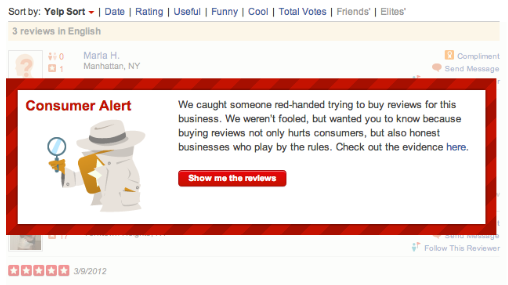 |
| Yelp is fighting to maintain the integrity of positive reviews on its site. Source: Yelp |
Yelp has started publicly branding companies it suspects of buying fake evaluations. The consumer review site said on its blog on Oct. 18 that it's getting even tougher on reviews it thinks may have been bought and paid for. When Yelp users visit a site that has been caught gaming the system, they will be greeted by a "warning" message that lets them know the business has been caught red-handed trying to buy positive reviews.
If a business has had a large number of reviews submitted from the same Internet Protocol (IP) address, it' an indicator that they lack authenticity, says Yelp.
For 90 days, a business that has been caught will be forced to bear the warning message as a type of scarlet letter, which will dramatically diminish the credibility of any review it has received. Yelp, with more than 60 million monthly visitors, already had a review filter in place and understands that its own reputation hinges on the credibility of the reviews posted by its users.
Yelp says it "won't let a few bad apples spoil the bunch," but according to its own Q2 2012 data, 38% of reviews give five stars.
The stakes have never been higher for the company. Its user reviews are now built directly into Apple's new maps application, which means they are in the hands of literally every iPhone user. And if it seems improbable that a brand would actually try to game the system or pay for positive reviews, consider this: An extra half-star rating on Yelp causes restaurants to sell out 19% more frequently (increase from 30% to 49% of the time), according to a September 2012 UC Berkeley study.
We've already covered five communications tips for managing a brand's presence on Yelp, but it's time to add a sixth: Ask customers to review your business, but never try to game the system in any way.
Follow Bill Miltenberg: @bmiltenberg
